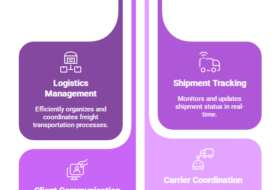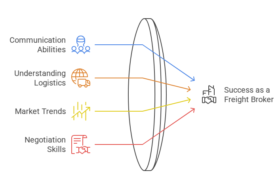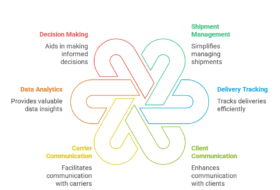freight broker license
Learn How to Get Your Freight Broker License and Start Your Own Successful Freight Brokering Business
Are you interested in starting your own successful freight brokering business? The first step is to obtain a freight broker license. This article will guide you through the process of obtaining a freight broker license, as well as provide tips and advice for starting and running your own freight brokering business.
Table of Contents
What is a Freight Broker?
Benefits of Starting a Freight Brokering Business
Requirements for Obtaining a Freight Broker License
Steps for Obtaining a Freight Broker License
How to Prepare for the Freight Broker License Exam
Choosing a Name and Registering Your Business
Obtaining a USDOT Number and MC Number
Setting Up Your Brokerage Operations transportation management software.
Hire staff if necessary, such as sales representatives or dispatchers.
Finding Shippers and Carriers
As a freight broker, you need to establish relationships with both shippers and carriers. You can find shippers and carriers through online directories, industry associations, and referrals from other brokers.
Negotiating Rates and Contracts
As a broker, it is your responsibility to negotiate rates and contracts with shippers and carriers. You need to ensure that you are offering competitive rates while also making a profit.
Building Relationships with Shippers and Carriers
Building strong relationships with shippers and carriers is crucial for the success of your business. You need to provide excellent customer service and communicate effectively with your clients.
Managing Your Finances and Cash Flow
Managing your finances and cash flow is essential for the success of your business. You need to keep track of your income and expenses, and ensure that you have enough cash flow to cover your expenses.
Marketing Your Business
Marketing is important for attracting new clients and growing your business. You can market your business through online advertising, social media, and networking events.
Common Mistakes to Avoid
There are several common mistakes that new freight brokers make, including:
Not having enough cash flow to cover expenses.
Failing to establish relationships with shippers and carriers.
Offering rates that are too low and not making a profit.
Failing to comply with FMCSA regulations.
Obtaining a freight broker license is the first step to starting your own successful freight brokering business. By following the steps outlined in this article, you can start your own business and become a successful freight broker.
FAQs
How much does it cost to start a freight brokering business?
You can start a freight brokering business with as little as $10,000.
How long does it take to obtain a freight broker license?
It can take up to 3 months to obtain a freight broker license.
What is a surety bond?
A surety bond is a contract between three parties: the principal (you), the surety (the insurance company), and the obligee (the FMCSA).
Do I need a commercial driver’s license (CDL) to be a freight broker?
No, you do not need a CDL to be a freight broker.
Can I operate my freight brokering business from home?
Yes, you can operate your freight brokering business from home, as long as you have a dedicated workspace and the necessary equipment.
Finding Shippers and Carriers
Negotiating Rates and Contracts
Building Relationships with Shippers and Carriers
Managing Your Finances and Cash Flow
Marketing Your Business
Common Mistakes to Avoid
Conclusion
FAQs
What is a Freight Broker?
A freight broker is a third-party logistics provider who acts as an intermediary between shippers and carriers. Freight brokers are responsible for arranging the transportation of goods from point A to point B, and they earn a commission on each transaction they facilitate.
Benefits of Starting a Freight Brokering Business
There are several benefits to starting a freight brokering business, including:
Low startup costs: You can start a freight brokering business with very little capital.
High earning potential: The average freight broker earns around $60,000 per year, but top earners can make six figures.
Flexibility: You can work from home and set your own hours.
Growing industry: The transportation industry is always in demand, and there is plenty of room for growth in the freight brokering sector.
Requirements for Obtaining a License
In order to obtain a freight broker license, you must meet the following requirements:
Be at least 21 years old.
Have a clean criminal record.
Have a $75,000 surety bond or trust fund.
Pass the freight broker license exam.
Steps for Obtaining a Freight Broker License
Here are the steps you need to follow to obtain a license:
Apply for a USDOT number and MC number through the Federal Motor Carrier Safety Administration (FMCSA).
Obtain a $75,000 surety bond or trust fund.
Register for the freight broker license exam through the FMCSA.
Study for the exam.
Pass the exam.
How to Prepare for the Freight Broker License Exam
The freight broker license exam consists of 80 multiple-choice questions and covers topics such as:
FMCSA regulations
Freight brokering operations
Business practices
To prepare for the exam, you should:
Study the FMCSA regulations.
Take a freight broker training course.
Use practice tests to familiarize yourself with the exam format and content.
Choosing a Name and Registering Your Business
Before you can start your freight brokering business, you need to choose a name and register your business. You can register your business as a sole proprietorship, partnership, LLC, or corporation.
Obtaining a USDOT Number and MC Number
In order to operate as a freight broker, you need to obtain a USDOT number and MC number through the FMCSA. These numbers allow you to operate as a licensed motor carrier.
Setting Up Your Brokerage Operations
To set up your brokerage operations, you need to:
Set up a home office or rent office space.
Obtain the necessary equipment, such as a computer, phone, and







